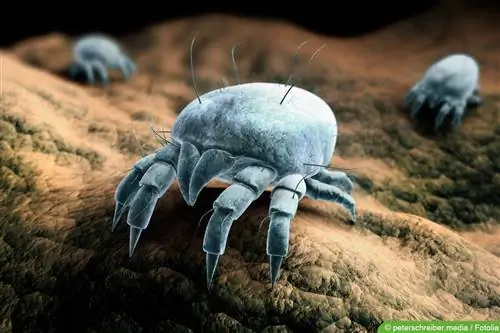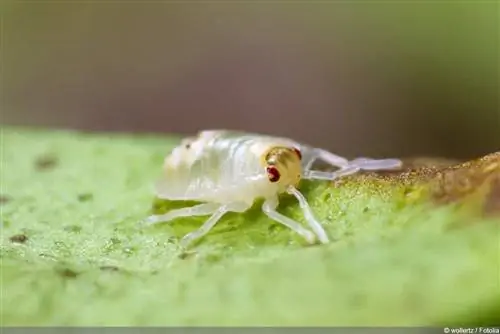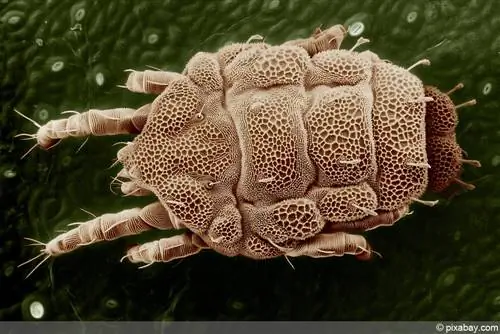- Author admin [email protected].
- Public 2023-12-17 03:39.
- Last modified 2025-01-24 12:45.
Gardening enthusiasts fear little more than the common spider mite, which tends to appear in dry, warm weather and usually multiplies explosively. Because it is often discovered too late, combating it is difficult. Although there are various chemical remedies for disposal, most hobby gardeners prefer to use tried and tested home remedies to protect the environment.
Various spider mites attack rose bushes
There are different types of spider mites that can attack rose bushes. The common spider mite is the most common. Unfortunately, gardeners usually only recognize the infestation when it is too late and the first leaves appear wilted and limp. An important measure to prevent spider mite infestations from occurring in the first place is the right location for roses. Roses that often suffer from spider mite infestations are usually located close to the house wall or in places where there is hardly any air circulation. A rose should be in a sunny position, but should also be exposed to constant air movement. In addition, a strong, he althy rose is not attacked by pests because it develops its own defenses. That's why high-potassium fertilization should be carried out regularly to strengthen the rose itself. Clean rose beds also help to protect the rose, as the spider mite's trails can run through damp leaves.
Proven home remedies
Fighting spider mites is so difficult because most agents are suitable for either killing the larvae or eliminating the adult mites. There are various chemical cocktails available from specialist retailers that many garden owners swear by. However, they usually damage the environment and ultimately the plant itself. It therefore makes sense to use tried and tested home remedies, which are usually cheaper. A simple method is to wash the rose bush with lukewarm water and add a few drops of dish soap. This removes the adult spider mites and also eliminates most of the larvae. However, it is rare that this treatment works the first time. After two days, the larvae hatched and survived this treatment and started a new spider mite cycle. It is therefore recommended to repeat this treatment a total of three times every two days to ensure that no new spider mite cycle begins.
Natural enemies
Biologically oriented gardeners tend to believe that they are strengthening the balance of nature and therefore rely on their natural enemy, the predatory mite, to combat spider mites. It can be purchased inexpensively from specialist retailers and the animals are simply released onto the infected rose bushes. Nature will do the rest by itself. This method has several advantages because an excessive infestation of spider mites can only occur if the natural enemies are missing. Although this method costs a bit of money, it also has the advantage of being simple and convenient, which is particularly suitable for gardeners with little time. Unfortunately, the predatory mite also passes to humans, but this can be avoided by carefully following the supplier's instructions. The predatory mites usually only have to be settled in the garden once in order to then control the spider mite population. In this way, and by choosing the right location for roses, the roses usually remain protected from spider mite infestation in the long term.
Spray solutions for large areasl
If a gardening friend has several rose bushes that are infested with spider mites, they can also use a garden sprayer to stop the infestation. You can make a decoction yourself from various substances that kills the spider mites. This broth includes nettle leaves, lots of garlic and onions, which are poured over with boiling water. The brew steeps overnight and is then strained. Many hobby gardeners consider the smell to be a pest controller, but both the onion and the garlic contain various essential oils that also have an antiseptic and antibacterial effect. That is why these ingredients also attack the spider mites in their adult state as well as the larvae. However, with this measure it is better to repeat this procedure every two days in order to permanently break the cycle of the mites, which take 20 days from larvae to sexual maturity.
Tip:
Instead of making a decoction of nettles, onions and garlic, you can also use neem oil. Simply add it to the water according to the recipe and then spray it onto the affected rose bushes. Neem oil is the oil from the seeds of the neem tree and has, among other things, antibacterial and antiviral effects, and it also permanently eliminates the plague of spider mites.
Tropical House Method

The tropical house method is an effective method, although not so visually striking for a few days. Spider mites like dry and warm climates, but they cannot tolerate high humidity. That's why a hobby gardener may want to use a plastic bag if the plant isn't too big. First, the rose must be watered well and then placed in a closed, transparent plastic bag that is tightly closed on the rose bush. This shell now creates an unpleasant climate for spider mites in that they do not thrive but die. The plastic bag can be removed after three days without damaging the plant. This method also has the advantage that the spider mite has no chance of spreading to other plants. After all, the common spider mite can inhabit up to 100 different plants. However, this method is only suitable for rather small varieties and climbing roses or large rose bushes can no longer be treated this way.
Frequently asked questions
How do I avoid spider mite infestation?
On the one hand, it helps to plant the rose in an ideal location and strengthen it with potash fertilizers. But it is also important to remove the dead leaves from plants, as the mites overwinter on such leaves and begin a new spider mite cycle in the spring.
Which is better, home remedies or chemicals?
Many people swear by chemical control agents. But home remedies kill spider mites just like toxic pesticides. However, they cause less damage to the environment and how the spider mite dies is irrelevant as long as it dies.
How do I fight spider mites inexpensively?
The chemical aids are far more expensive than the often tried and tested household tips.
What you should know about spider mites in brief
malicious image
- Both the larvae and the adults suck plant sap and thus weaken the plants.
- The female spider mites hibernate. If you're unlucky and the conditions are good, they'll start laying eggs in spring.
- With light infestation, fine, yellowish speckles can be found on the rose petals.
- If you overlook the little creatures and do nothing about them, the leaves turn yellow or bronze and often fall off.
- You can see the spider mites with a magnifying glass. They are located on the undersides of the leaves.
- When the infestation is severe, you can see the typical webs, especially around the buds and upper branch sections and in the branch forks.
Prevention
- It is important to find the ideal location for the roses. It should be sunny, but also airy.
- Spider mites tend to appear when the humidity is low and there is no air movement.
- They are particularly common on plants that grow under roofs, on walls and in corners of houses.
- Only he althy, strong roses are resistant to diseases and pests.
- A balanced and calibrated fertilization serves to strengthen the roses.
- It is important to remove fallen leaves and plant residues in autumn. This prevents the mites from migrating to the roses.
Combat
- Chemical control is often the only way to get rid of the pests. Most products use rapeseed oil as an active ingredient.
- But acequinocyl, mineral oils, potash soap or fenpyroximate are also used.
- There are sprays, sticks that are stuck into the ground and products that have to be dissolved in the irrigation water.
- The substances that are absorbed by the plants have proven to be effective. When the spider mites suck on the rose, they ingest it and die.
- It is difficult to get all the animals with one spray. Only a few have to survive and the cycle begins again.
Tip:
Predatory mites are also effective. They specialize in animal cells and have no interest in plants. When they have destroyed their food source, they also die. The advantage of predatory mites is that no poisons are used. There are no residues. However, the mites can also infect people, so you have to be careful.
Home remedies
- Mix a few drops of dishwashing liquid with water and spray the roses with it.
- However, you have to spray more on the underside of the leaves, because that's where most of the spider mites are.
- However, you shouldn't spray when it's sunny because then the leaves will burn.
- You have to repeat the process every few days until you get rid of the pests.
- However, there is one disadvantage. Dishwashing liquid also loosens the protective wax layer on the rose leaves.
- This gives fungal spores free access and you may end up in the rain.
- It can also help to boil a handful of cigarette butts, sift them and water the plants with them.
- The solution is good for potted plants, but only limited for planted roses because a lot of water simply runs away.






